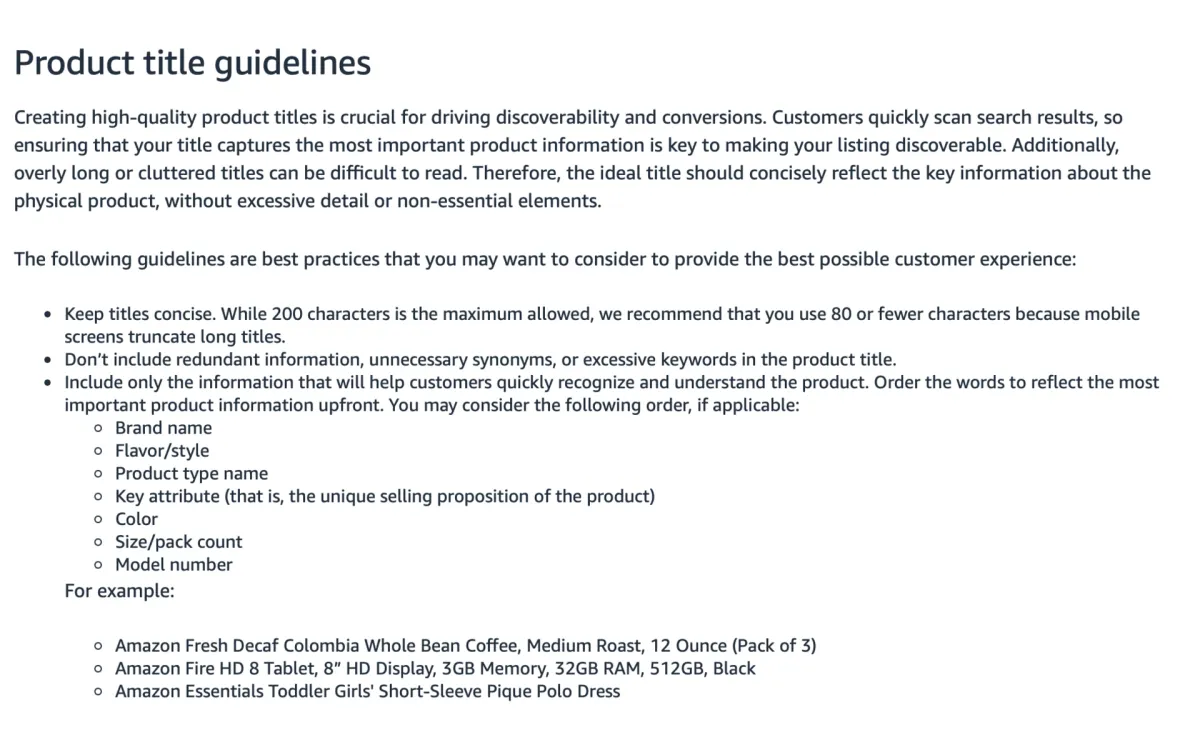

In a policy update announced on January 3, 2025, Amazon introduced new requirements for product titles across its global marketplaces, taking effect in 18 days. According to the announcement posted on Amazon's Seller Forums, the changes aim to standardise listings after observing increasingly lengthy product titles containing redundant information.
The updated policy establishes a 200-character limit for most product categories, counting spaces. Certain special characters face restrictions under the new guidelines. According to Amazon's documentation, the characters !, $, ?, _, {, }, ^, ¬ and ¦ will not be permitted in titles unless they form part of an established brand name.
Multiple word usage receives additional scrutiny. The policy prohibits using the same word more than twice within a single title, though prepositions, articles, and conjunctions remain exempt from this limitation.
Brand owners maintain some control over the transition process. According to the announcement, Amazon will provide override suggestions for non-compliant titles through their Review listing updates interface. These brand owners receive a 14-day window to implement changes before Amazon automatically updates titles to meet the new requirements.
The implementation strategy follows a gradual approach. While the policy takes effect on January 21, Amazon confirms that existing listings will remain active throughout the transition period. Sellers retain the ability to edit product titles, provided the changes comply with the updated guidelines.
One seller raised concerns about the special character restrictions impacting book titles. According to a forum post by Seller_FQHkqHJI5SqTh, titles like "Who's Afraid of Virginia Woolf?" require question marks as integral components of their original publication names. The inquiry about potential catalogue removals remains unanswered in the forum thread.
This product title policy change coincides with other significant updates to Amazon's marketplace operations in early 2025. According to separate announcements on the seller forums, January 1 marked the implementation of new Value Added Tax (VAT) rules for ecommerce sales to Swiss customers, including the Principality of Liechtenstein and the German municipality of Büsingen.
The VAT changes extend to invoice documentation. Amazon's VAT Calculation Services now generates shorter invoice numbers, limiting them to 14 characters to facilitate more efficient processing in business customers' accounting systems. According to the announcement, the modified format maintains unique and sequential numbering.
Amazon plans to address seller questions about the Swiss VAT implementation through an Ask Amazon event scheduled for January 21, 2025. This timing aligns with the product title policy enforcement date, marking significant procedural changes for marketplace sellers in early 2025.
The new title requirements represent part of broader standardisation efforts in ecommerce product listing practices. Character limitations and formatting rules aim to create consistency across marketplace categories. The policy's implementation through a phased approach, with preservation of listing status and seller editing capabilities, indicates consideration for business continuity during the transition period.
For brand owners, the 14-day review window provides an opportunity to maintain control over product presentation while adapting to the new standards. The gradual rollout of override suggestions suggests an automated compliance system operating alongside manual seller interventions.
The concurrent timing of VAT documentation changes and title requirements demonstrates the complexity of marketplace policy updates. Sellers must navigate multiple procedural changes while maintaining active listings and managing international tax compliance.
The forum discussions highlight potential challenges in policy implementation, particularly regarding products with established naming conventions that conflict with the new requirements. The treatment of punctuation in book titles exemplifies the intersection of standardisation goals with existing product nomenclature practices.

